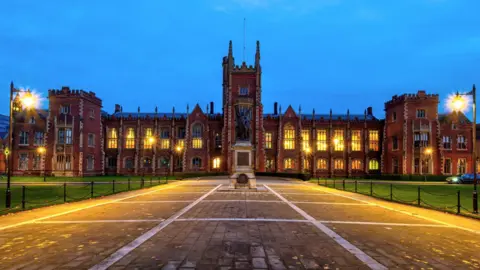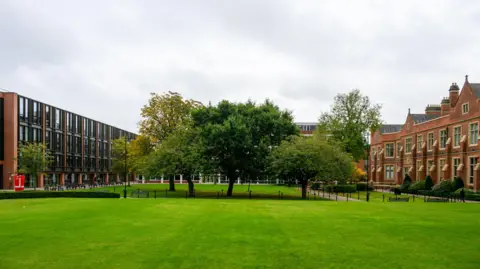'Scandalous' move by university to open India campus amid job cuts
 Getty Images/elxeneize
Getty Images/elxeneizeQueen's University Belfast has been criticised for its decision to open a campus in India, after it announced 270 job cuts in Northern Ireland through a voluntary redundancy scheme.
The University and College Union, which represents many lecturers and support staff, described the move as "scandalous".
It said Queen's receives "significant funding" from Stormont and accused the university of using public money to fund redundancies in Belfast while expanding abroad.
However Queen's said it was facing a financial deficit amid a "sharp decline" in international students and so it had to take a number of actions to cut its costs. It added the redundancy scheme was wholly voluntary.
The 270 redundancies at its Belfast campus were announced in October.
It equates to more than 5% of the university's workforce.
At the time, BBC News NI saw documents which suggested Queen's University Belfast (QUB) was facing a deficit of more than £11m for the financial year 2024-25.
Then last week, the university announced that it plans to open a campus in Gujarat International Finance Tec-City (GIFT City) in India next year.
It said the move would "reinforce partnerships and opportunities for innovation with local industry, government and business sectors across India and Northern Ireland".
Initially, the new campus will offer five postgraduate programmes which QUB said would be "tailored to the specific needs of the Indian economy".
Belfast job losses 'scandalous'
The University and College Union (UCU) accused the university of "directing taxpayer money into axing jobs in Northern Ireland while creating them on foreign shores".
"It is scandalous that QUB is putting massive amounts of money into a new campus halfway round the world all the while axing jobs in Belfast," said UCU general secretary Jo Grady.

Katharine Clarke, from the UCU, told BBC News NI's Good Morning Ulster programme that Northern Ireland universities were in a better position financially compared to the rest of the UK, as more than 50% of the university's funding comes from the Department for the Economy.
She added that the university had not provided a justified business case, and it had not cooperated with providing financial information to the union in a readable format.
Queen's India campus costing £5m-£7m
However, QUB acting chief people officer Alistair Finlay defended the decision to open the campus in India, adding that the current funding model for higher education did not work as the money from Stormont did not cover the costs of home students from Northern Ireland.
He said Queen's was investing between £5m-£7m in the new campus.
Addressing concerns around financial transparency with the union, Mr Finlay told Good Morning Ulster that QUB had provided a "large amount of information".
"We have done everything we can to engage with the trade unions in this whole discussion so that everybody can understand what is driving this but we need to balance our income," he added.
The union has described the planned redundancies as "brutal and unnecessary" and said it was deeply concerned about the workloads faced by the remaining staff.
It claimed the severance process "requires applicants to outline how their duties will be redistributed among remaining colleagues or otherwise suppressed".
 Getty Images/Jun Zhang
Getty Images/Jun ZhangIn its statement, QUB said it was reacting to the financial challenges "being faced right across the UK higher education sector".
It explained that Northern Ireland universities "face an additional challenge" because of a cap on the number of "home students" it can admit.
In previous years, QUB balanced its books through the fees charges to international students, but there is now a "sharp decline" in those students coming to the UK.
